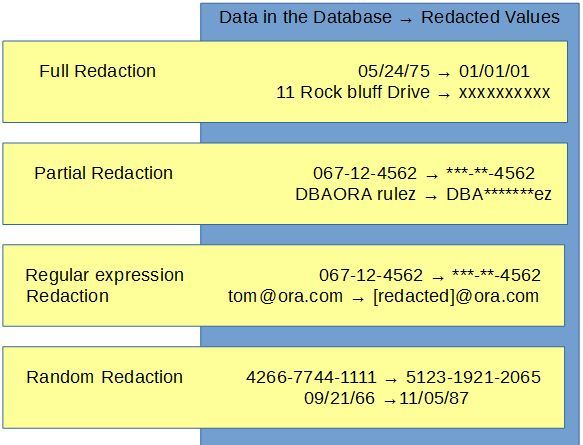Oracle Data Redaction enables you to mask (redact) data that is returned from queries issued by applications.
You can redact column data by using one of the following methods:
- Full redaction. You redact all of the contents of the column data. The redacted value returned to the querying application user depends on the data type of the column. For example, columns of the NUMBER> data type are redacted with a zero (0), and character data types are redacted with a single space.
- Partial redaction. You redact a portion of the column data. For example, you can redact a Social Security number with asterisks (*), except for the last 4 digits.
- Regular expressions. You can use regular expressions to look for patterns of data to redact. For example, you can use regular expressions to redact email addresses, which can have varying character lengths. It is designed for use with character data only.
- Random redaction. The redacted data presented to the querying application user appears as randomly generated values each time it is displayed, depending on the data type of the column.
- No redaction. The None redaction type option enables you to test the internal operation of your redaction policies, with no effect on the results of queries against tables with policies defined on them. You can use this option to test the redaction policy definitions before applying them to a production environment.
Oracle Database applies the redaction at runtime, when users access the data (that is, at query-execution time). This solution works well in a production system. During the time that the data is being redacted, all of the data processing is performed normally, and the back-end referential integrity constraints are preserved.
Data redaction can help you to comply with industry regulations such as Payment Card Industry Data Security Standard (PCI DSS) and the Sarbanes-Oxley Act.
Benefits of Using Oracle Data Redaction
Oracle Data Redaction provides several benefits when you use it to protect your data.
These benefits are as follows:
- You have different styles of redaction from which to choose.
- Because the data is redacted at runtime, Data Redaction is well suited to environments in which data is constantly changing.
- You can create the Data Redaction policies in one central location and easily manage them from there.
- The Data Redaction policies enable you to create a wide variety of function conditions based on SYS_CONTEXTvalues, which can be used at runtime to decide when the Data Redaction policies will apply to the results of the application user’s query.
In the next article we will show how to configure Oracle Data Redaction.
Source: Click here


